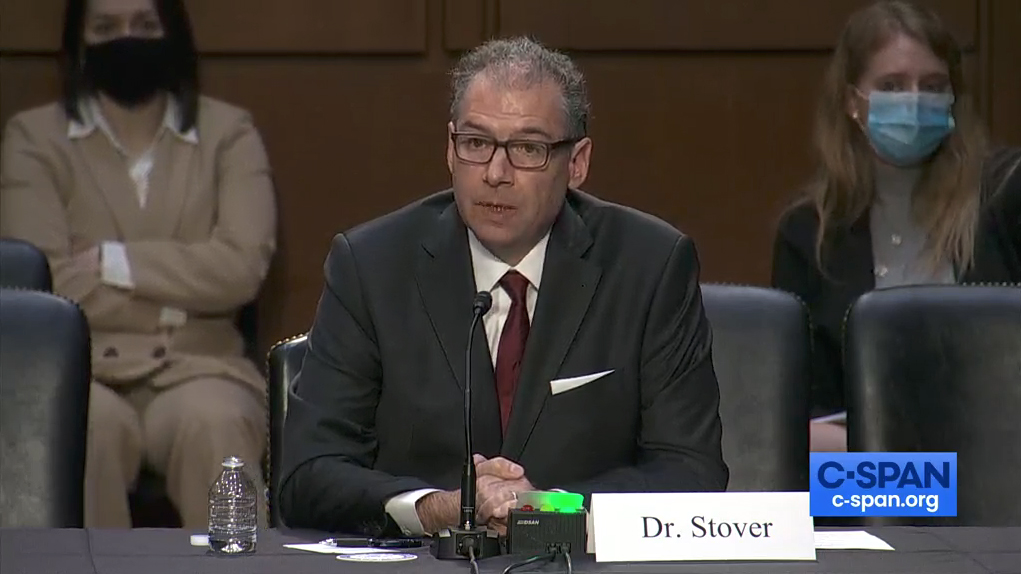Agriculture’s role in improving public health
Texas A&M AgriLife’s Stover testifies during congressional State of Nutrition in America 2021
The U.S. Senate Committee on Agriculture, Nutrition and Forestry Subcommittee on Food and Nutrition, Specialty Crops, Organics and Research held a hearing Nov. 2 to discuss the State of Nutrition in America. Among calls for the second White House Conference on Food, Nutrition, Hunger and Health — the last of which was held over 50 years ago — one voice highlighted the essential role of agriculture in any conversation about nutrition.

“We need to build upon the Borlaug legacy in a revolutionary new way: by expanding our mission from simply using food to eliminate hunger and undernutrition to using food to become healthier,” said Patrick J. Stover, Ph.D., vice chancellor of Texas A&M AgriLife, dean of the College of Agriculture and Life Sciences, and director of Texas A&M AgriLife Research. “This can only be achieved by innovating throughout the entire food supply chain and by advancing rigorous science — not merely focusing on what some deem to be ‘healthy foods.’”
The challenge of nutrition security
Stover’s comments were made during his congressional testimony to the subcommittee, where he was among four other experts speaking about nutrition in America and the challenges facing the U.S. amid an epidemic of chronic diet-related disease that has been exacerbated by COVID-19.
Today, half of all American adults suffer from diabetes or pre-diabetes, and 122 million Americans have cardiovascular disease, which alone results in around 840,000 deaths each year. At the same time, food security is a major issue that has worsened as a result of the pandemic. Before the pandemic, one in eight Americans faced food insecurity; yet now, high rates of unemployment driven by the coronavirus are expected to leave another 18 million U.S. children food insecure. It is expected that at least 40% of all U.S. youth will soon be food insecure.
“Urbanization, gaps in knowledge, competing agendas and a deficit in public trust all contribute to the growing disconnect between people and the food they eat,” Stover said. “To put it bluntly, that disconnect threatens agriculture, the food supply and the health of our society. Fortunately, agriculture is uniquely positioned to be the solution. With current and emerging technologies, we can tailor agriculture and food systems to support any and all desired outcomes.”
Texas leading by example with two new efforts toward solutions
There are solutions on the horizon, Stover said. And Texas A&M AgriLife is well-positioned to lead nationally in partnership with other land-grant universities and U.S. Department of Agriculture Agricultural Research Service, USDA-ARS, centers.
As the largest comprehensive agriculture program in the country, Texas A&M AgriLife is taking a connected systems approach — linking the “production” and “consumer” domains — by launching two innovative efforts to connect agriculture and health.
First, Texas A&M AgriLife’s new Institute for Advancing Health Through Agriculture, IHA, is the world’s first research institute to bring together precision nutrition and responsive agriculture research. The institute aims to link food production to human consumption as a way to improve public health and lower health care costs.
The IHA will also advance research to help agricultural producers harness big data, artificial intelligence and machine learning to produce food that improves public health. A recent example is a previously inedible cotton byproduct that can now be a highly nutritious food source worldwide.
Second, the new Agriculture, Food and Nutrition Scientific Evidence Center at Texas A&M AgriLife will be a global resource for policy makers in providing non-biased, scientific evidence reviews about environmental, economic and human health outcomes related to agricultural and food policy.
“I am grateful for the investments from the state of Texas and USDA-ARS that have enabled Texas A&M AgriLife to launch these two long-term innovative efforts,” Stover added.
Agriculture must be at the table
Stover implored the committee to ensure, as discussions on this important topic continue, that agriculture must be part of the dialogue.
“The costs of the current situation cannot be overstated. Diet-related chronic diseases place a huge financial burden on individuals, the health care system and the American economy — and are crippling quality of life for most Americans,” he said. “While historic efforts to eliminate hunger and food insecurity were important and well-intentioned, hunger cannot be considered in the absence of agriculture and health.”
The hearing recording can be viewed online in its entirety. Stover’s full written testimony is also available.


